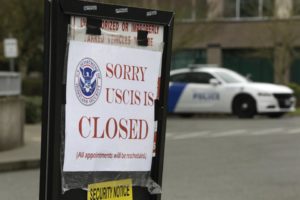 The Trump administration will increase fees on businesses, new citizens and international students who need work authorization. The new fee rule from U.S. Citizenship and Immigration Services (USCIS) is the latest Trump administration action to restrict immigration to the United States and make life more difficult for businesses seeking skilled workers and individuals who want to be American citizens.
The Trump administration will increase fees on businesses, new citizens and international students who need work authorization. The new fee rule from U.S. Citizenship and Immigration Services (USCIS) is the latest Trump administration action to restrict immigration to the United States and make life more difficult for businesses seeking skilled workers and individuals who want to be American citizens.
On July 31, 2020, the Department of Homeland Security (DHS) – USCIS is part of DHS – released to the public the final version of a fee rule first proposed in November 2019. The fees will go into effect on October 2, 2020.
“The significant fee increases on employment-based immigrant and nonimmigrant petitions are nothing more than new taxes on businesses that must be paid to meet their company’s workforce needs,” said Jon Baselice, executive director for immigration policy at the U.S. Chamber of Commerce, in an interview. “This final rule suffers from many of the same critical flaws included in the agency’s original proposal, and given the level of concern on the part of many companies with respect to those issues the fight over this rule is far from over.”
Below is a summary of the key fee changes:
H-1B and L-1 Visas: The fee for L visa petitions will increase by 75%, rising from $460 to $805. The fee for an H-1B petition will rise by 21%, from $460 to $555.
USCIS will impose much higher fees on companies with more than 50 employees that have at least 50% of their workforce in H-1B and L-1 status. USCIS states in the final rule it has reinterpreted the law to impose an additional $4,000 fee not just on initial H-1B petitions and a $4,500 fee on initial L-1 petitions, as is the current practice laid out in the statute (Public Law 114-113). USCIS also will impose the fee for extensions when the fraud prevention and detection fee is not collected, which means, in practice, the fee will be required whenever an employee’s status is extended.
“The change in how DHS interprets the applicability of the Public Law 114-113 fee is unreasonable and runs contrary to clear statutory language indicating the 50/50 fees should apply only to petition filings where the fraud prevention and detection fee is also required,” said Vic Goel, managing partner of Goel & Anderson, in an interview. “Curiously, the agency dismisses these concerns, but fails to state a valid substantive basis for why DHS now disagrees with its own prior guidance.” (See here for more on the legislative history.)
To read this article in full, please visit Forbes.
